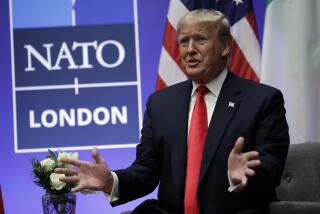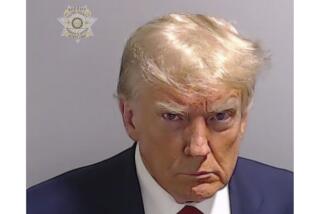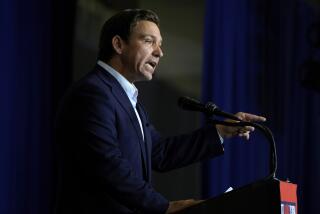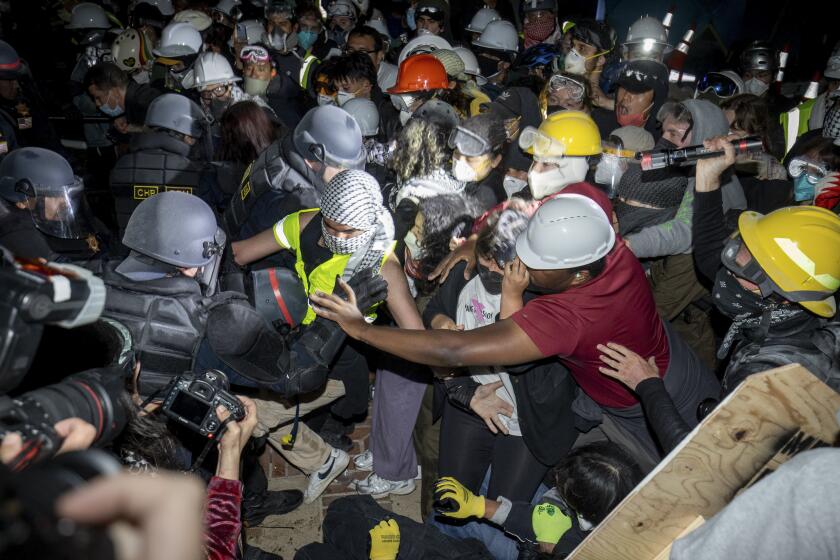Trump sows confusion with tweet conceding Russia helped him win the 2016 election

President Trump insists that “Russia didn’t help me” get elected.
Maybe it was a presidential epiphany. More likely, it was a Twitter miscue.
Either way, President Trump appeared to concede for the first time Thursday that Russian intelligence agents tried to help him win the 2016 election, as the U.S. intelligence community has concluded, a reversal of his long-held claims.
Trump later reversed himself again but the episode highlighted the difficulty he faces rejecting the official U.S. assessment, backed up by special counsel Robert S. Mueller III’s recent investigation and two grand jury indictments, that the Kremlin deployed a combination of fake news stories, phony social media accounts and hacked Democratic Party documents intended to damage Hillary Clinton and help Trump.
Speaking to reporters, Trump also claimed that Mueller was “totally conflicted” and a “true never-Trumper” who led a biased probe, a curious claim since he has repeatedly praised Mueller’s 448-page final report for, in the president’s eyes, fully exonerating him of any wrongdoing.
He added that Mueller — who had served as FBI director from 2001 to 2013 — wanted to lead the bureau again but the president told him no. “He’s somebody who didn’t get a job that he wanted very badly,” Trump said. No evidence suggests that is true.
RELATED: Read the special counsel’s full remarks »
Trump is loath to acknowledge that the Kremlin put its thumb on the scale in 2016, insisting against all independent evidence that the story was made up by sore losers in the Democratic Party to discredit his unlikely victory.
But he appeared to acknowledge reality in his tweets Thursday, a day after Mueller had publicly warned of “multiple systematic efforts to interfere in our election” and urged Americans to do more to protect future elections.
In the midst of angry posts about Mueller’s investigation, Trump wrote, “I had nothing to do with Russia helping me to get elected. It was a crime that didn’t exist.”
Reporters and Democratic lawmakers immediately seized on the head-snapping phrase “helping me get elected.”
“The President is acknowledging that a foreign power helped get him elected,” Rep. Katherine Clark, a Massachusetts Democrat, wrote on Twitter. “This isn’t a joke.”
She then urged Trump to sign onto a bill intended to shield elections from foreign interference, something Trump has thus far resisted.
Trump deleted the tweets minutes after posting them, suggesting he had misspoken. But then he reposted them, fixing a misspelling of the word “accusation,” but leaving the phrase “helping me get elected” intact.
So did he really mean it?
Later, talking to reporters on the South Lawn of the White House, Trump was asked to clarify in person.
“Russia didn’t help me at all,” Trump said, returning to his old talking point. “Russia, if anything, I think, helped the other side.”
There is no evidence that Russia tried to help Clinton’s campaign.
RELATED: Mueller statement ramps up impeachment pressure on Pelosi and House Democrats »
Trump didn’t stop there. He raised prior claims that Mueller had a conflict of interest because of an old dispute over membership fees at Trump National Golf Club in Northern Virginia. Trump’s own advisors have told him that Mueller’s prior request for a refund on his club dues did not amount to a conflict.
Mueller is a registered Republican and his views of Trump are unknown beyond his refusal to publicly clear him of a crime. “If we had had confidence that the president clearly did not commit a crime, we would have said so,” Mueller said Wednesday at the Justice Department, hardly a vote of confidence.
Trump also confirmed a Wall Street Journal report that the White House tried to keep the John S. McCain, a Navy destroyer, “out of sight” when he toured Yokosuka Naval Base in Japan, on Tuesday. The president said he did not direct his aides to conceal the warship’s name, but seemed unbothered that they did.
“John McCain, I wasn’t a fan, but I would never do a thing like that,” Trump told reporters. “Now, somebody did it because they thought I didn’t like him. OK? And, they were well-meaning, I will say. I didn’t know anything about it.”
Meghan McCain said on ABC’s “The View” that Trump’s persistent attacks on her late father, a former Republican senator from Arizona and the GOP’s presidential nominee in 2008, “creates a culture” whereby members of the military are “clearly fearful” to wear hats or display banners with McCain’s name.
“The president’s actions have consequences,” she said.
FULL COVERAGE: The Mueller report »
Trump remains furious at House investigations of his finances and businesses, and apparently by the growing number of Democrats, including several running for president, to start impeachment proceedings. He described impeachment as a “dirty, filthy, disgusting word.”
Much of Trump’s newest frustration stemmed from Mueller’s statement Wednesday. Saying he didn’t intend to speak again on the matter, Mueller reiterated that his report did not exonerate Trump on obstruction charges and said that he declined to weigh in on whether Trump committed a crime only because Justice Department rules prevented it.
Trump’s campaign manager, Brad Parscale, blamed the confusion over Trump’s Russia tweets on the media, lashing out at the New York Times for posting a story suggesting Trump now agrees with Mueller’s view of the 2016 election.
“The editors at @nytimes want nothing more than to take one typo and have it redefine 10,000 on the record comments,” Parscale wrote on Twitter. “Disgusting and unprofessional!”
But it’s hard to say it was just a typo. If anything, it’s a reminder that Trump’s unfiltered tweets, often written while watching Fox News, can be hard to interpret. Administration officials have at times called them official policy while former Chief of Staff John F. Kelly insisted that the only way to perform his job was to ignore them.
Not only are they rife with spelling and grammatical errors, they often veer toward political commentary or momentary reactions to news and opinion segments.
When asked to explain how seriously to take the tweets last year, deputy press secretary Hogan Gidley said, elliptically, “You know by the result.”
More to Read
Start your day right
Sign up for Essential California for news, features and recommendations from the L.A. Times and beyond in your inbox six days a week.
You may occasionally receive promotional content from the Los Angeles Times.







